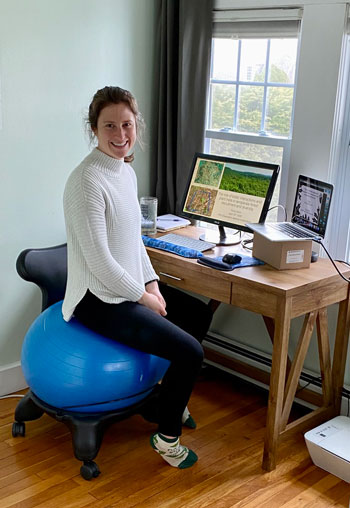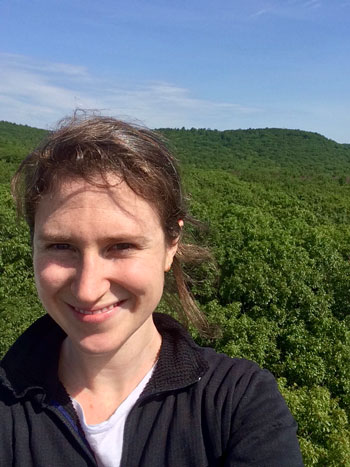Catching Up with Fiona Jevon, SES Class of 2011 | Sung Bin Park

“One thing that might not show up on brochures about the MBL’s Semester in Environmental Science (SES) program is one of the most important: As a student, you are given the chance to join this enclave of awesome scientists. They know your name, what you did for your independent project, and what sorts of science you are interested in. As a senior in college, when I was thinking about what I wanted to do next, I reached out to them for opportunities. In fact, ever since I was a SES student, the people at the MBL Ecosystems Center have been mentors and resources for me. That’s how I ended up with research positions at Toolik Lake and at Palmer Station, and how I ended up back at MBL now!” --- Fiona Jevon
 Fiona Jevon defends her PhD dissertation via Zoom from her Falmouth home on April 10. Credit: Judson Poole
Fiona Jevon defends her PhD dissertation via Zoom from her Falmouth home on April 10. Credit: Judson PooleFiona Jevon, a Semester in Environmental Science alumna from 2011, just defended her PhD dissertation (via social distancing Zoom call) in the Ecology, Evolution, Environment and Society program at Dartmouth College. She has been working on her thesis at the MBL Ecosystems Center as a visiting student since the fall of 2019.
Fiona's thesis is about how forests maintain tree diversity. “The big questions that guide my work include: How do lots of different species of trees coexist in a forest? How come forests in the tropics have so many more species of trees?” she says. “More specifically, I try and test whether biological interactions, such as competition between seedlings of the same species or the presence of soil pathogens, help to promote or degrade diversity."
“For me, SES was a blast,” says Fiona, who was an undergraduate at Harvard University when she participated in SES. “Now that I know more about best practices in teaching, I understand why it appealed to me so much. It completely flips the traditional method of teaching science on its head: The emphasis is on answering interesting scientific questions with data that *we as students* collected, with only enough lecture and background reading material to glue it all together. People like to bandy around the terms ‘hands on’ and ‘experiential learning.’ SES has those in spades.”
 Fiona Jevon at Harvard Forest, an ecological research site in Petersham, Mass., where she conducted her PhD thesis research.
Fiona Jevon at Harvard Forest, an ecological research site in Petersham, Mass., where she conducted her PhD thesis research.After her time in the SES program, Fiona went on to work as a research assistant at Toolik Field Station in Alaska and at Palmer Station in Antarctica, and twice served as a teaching assistant for SES. The latter “was a really great way to get more experience with lab and field methods, mentoring and teaching, and more familiarity with research in general," she notes. In the autumn of 2014, she remained at the MBL to work as a research assistant for Chris Neill, then a senior scientist in the Ecosystems Center, to analyze data for a cranberry bog biogeochemistry project. For this, she worked alongside the science director of the Coalition for Buzzards Bay, a local non-governmental organization.
How has SES prepared Fiona for her current research? “I found out that I really liked field work, which helped me to decide on my graduate school projects,” she says. One of Fiona’s doctoral committee members, Caitlin Hicks Pries, is also a SES alumna from the class of 2003. “That was a happy coincidence, but I think just goes to show where SES alums often end up! Doing SES makes you a part of the community, and it’s a small world (in the best possible way),” Fiona says.
Fiona has these words of advice for prospective SES students. “You don’t have to be sure you want to go into research to do SES. SES will set you up really well to go on to pursue research, like I have and Caitlin did, if that’s what you want. …In fact, I think SES is particularly great for students who aren’t completely sure what they want to do, because it gives you a real dose of what various types of research are like: from field-based observational studies, to lab-based chemistry and microbial ecology, to mathematical modeling,” she says. “No matter what you end up doing, the skills you get during SES will help you!”